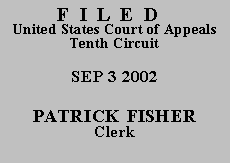

| UNITED STATES OF AMERICA,
FERMIN ROSALES-SANDOVAL, |
No. 01-2377
(D. New Mexico) |
On appeal, counsel for Rosales-Sandoval filed an Anders brief and moved to withdraw as counsel. See Anders v. California, 386 U.S. 738, 744 (1967) (permitting counsel who considers an appeal to be wholly frivolous to advise the court of that fact, request permission to withdraw from the case, and submit a brief referring to portions of the record that arguably support the appeal). In the Anders brief, counsel stated that he could find no error in the district court's imposition of the forty-six month sentence, and he accordingly referred to no portion of the record that might support Rosales-Sandoval's appeal. Rosales-Sandoval was afforded an opportunity to respond to the Anders brief, but declined to do so.
We have fully examined the proceedings as required by Anders, id., and conclude that the appeal is wholly frivolous. First, the record shows that Rosales-Sandoval's guilty plea was voluntary. The district court informed Rosales-Sandoval in open court of the nature of the charge and the maximum penalty, and instructed him as to the rights he was giving up by pleading guilty. See Fed. R. Crim. P. 11 (discussing facts that must be disclosed to the defendant to ensure that his plea is voluntary).
With regard to the sentencing, there was some discussion at the hearing as to the precise offense level appropriate under the Sentencing Guidelines. When a defendant is convicted of unlawfully entering or remaining in the United States following a prior drug-trafficking conviction, the appropriate offense level varies depending on the length of the sentence imposed for the prior felony. U.S.S.G. § 2L1.2. If the sentence for the prior felony exceeded thirteen months, the base offense level is to be increased by sixteen levels; if the sentence was for less than thirteen months, the base offense level is to be increased by twelve levels. Id. Following his conviction for possession and sale of a controlled substance, Rosales-Sandoval was sentenced on June 21, 1996, to 180-days' custody and thirty-six months' probation. This sentence, however, was revoked on November 13, 1996, and Rosales-Sandoval was sentenced to two-years' custody.
Thus, the question might be raised which sentence should be considered for purposes of applying U.S.S.G. § 2L1.2: the original sentence, which was revoked, or the sentence imposed after revocation.(1) In our judgment, the reference to the "sentence imposed" in U.S.S.G. § 2L1.2 adverts to the second, post-revocation sentence, not the original sentence. Cf. United States v. Holbert, 285 F.3d 1257, 1263 (10th Cir. 2002) (basing a sentencing calculation on the post-revocation sentence when a defendant's original sentence had been revoked). Nonetheless, this is an issue we need not decide, given counsel's failure to object at sentencing. "Points raised but not argued below ordinarily will not be considered on appeal." Rademacher v. Colo. Ass'n of Soil Conservation Dists. Med. Benefit Plan, 11 F.3d 1567, 1571 (10th Cir. 1993).
The offense level and criminal history category were properly calculated by the district court, and the lowest sentence available for that offense level and category--forty-six months--was imposed. See U.S.S.G. ch. 5, pt. A (Sentencing Table). We see no issues in this case that might properly be the subject of an appeal. Accordingly, counsel's motion to withdraw is GRANTED, and Rosales-Sandoval's conviction is AFFIRMED.
The mandate shall issue forthwith.
ENTERED FOR THE COURT
Carlos F. Lucero
Circuit Judge
*. The case is unanimously ordered submitted without oral argument pursuant to Fed. R. App. P. 34(a)(2) and 10th Cir. R. 34.1(G). This order and judgment is not binding precedent, except under the doctrines of law of the case, res judicata, and collateral estoppel. The court generally disfavors the citation of orders and judgments; nevertheless, an order and judgment may be cited under the terms and conditions of 10th Cir. R. 36.3.
1. This issue would not affect calculation of Rosales-Sandoval's criminal history category, because his criminal history category would be the same whether the point total is four or five. See U.S.S.G. §4A1.1(a)(b); id. ch. 5, pt. A (Sentencing Table).